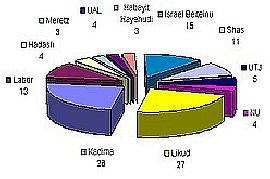.



Commentary:
This Jerusalem Post Evelyn Gordon commentary on Israel’s February national election and its lessons was too good to pass up.
While not mentioning Moshe Feiglin, Ratzon, etc. by name, Gordon deals with the post-primary demotions and their impact on the election vote for Likud, and thus the election result. This is important in that it seems to this author that she is the first columnist seen in Israeli MSM to have recognized the impact of the Likud primary result which was not respected, but rather uprooted, and the consequences of that uprooting in the national election result. Other prominent columnists such as Caroline Glick refuse to recognize aand come to grips with the Likud primary demotions and their impact in pre-election polls and election results.
In Glick’s case, while she professes to be a solid nationalist, she refuses to deal with these implications or deals with them in demeaning terms such as was directed at Feiglin and other faith-based candidates after the Likud primary. Presumably, this because (1) she (Glick) has been sooo enamored with Bibi for sooo long and (2) because Glick’s journalistic philosophy seems to be that of reliance on super-power authority rather than on a Higher Authority.
Bibi knocked Feiglin, Ratzon and other down because they are faith-based rightists who cleave to beliefs in our Divine legacy to the Land of israel and in reliance on Shemayim. But at least as equally important, when Bibi axed these candidates, he betrayed the voters, like Sharon did before him, in total disregard of a Likud vote, i.e. the referendum vote result and subsequent expediting of the expulsion of Jews from Gush Katif despite the vote which came down overwhelmingly against such expulsion.
There is no democracy when party or governing leaders change the rules of a primary or of an election after the votes are cast if the result doesn’t go their way. That is known as dictatorship, as demagoguery.
One can only hope that Evelyn Gordon’s commentary on the election and its lessons will be internalized, commented upon and gain gradual recognition of validty in MSM. MB
Lessons of the Election, by Evelyn Gordon (Jerusalem Post)
Excerpts:
On the Right, the results were an object lesson in the perils of short-changing democracy. And on the Left, they were an object lesson in what responsible voting can accomplish.
…Likud… lost seats by scorning their voters. …The drop was particularly dramatic: It shrank 25 percent in a mere two months, from a high of 36 seats in a poll taken the day after its primary to 27 seats in the election. All these seats clearly migrated rightward, since the overall rightist-religious bloc did not shrink. And that is the key to understanding what happened.
Likud’s primary produced a list attractive to rightists; hence many who had deserted the party in 2006 initially returned. But then, in a disgraceful and anti-democratic move instigated by chairman Binyamin Netanyahu, party institutions reordered the slate’s reserved slots three days after the primary to demote some of the hawks and promote left-leaning candidates, as Netanyahu wanted a “centrist” list. And disgusted rightists, unwilling to support a party whose leader so clearly did not want them, jumped ship.
…Primary voters… read the political map more accurately than Netanyahu. He thought the battle was over the Center, so he wanted a list that would appeal to Kadima voters. But the battle turned out to be over the Right – and primary voters had given him precisely the list he needed to win it. Thus had he honored their will, he would now head a larger, stronger faction and be better placed to form a stable, functional government.
Related report: Feiglin Still Blames Bibi for Likud Coming in Second, by Abe Selig (Jerusalem Post)
Instead, he woke up only belatedly, as Likud’s edge over Kadima in the polls steadily narrowed even though Kadima was also shrinking. He then tried to break right, but it was too late: Rightists refused to vote for someone who had shown them the door just two months earlier. Hence he is now in an impossible situation: Instead of being the obvious candidate to form a government, Tzipi Livni is in position to challenge him, enabling smaller parties to launch an extortionate bidding war.
THERE is the lesson of Kadima. According to pollster Rafi Smith, fully 40% of Kadima’s voters chose it just days before the election. They came overwhelmingly from the Left: Smith says Kadima took one-third of Labor’s voters and even more of Meretz’s. And they came for one reason only: As the gap between Likud and Kadima in the polls narrowed, leftists realized that supporting Kadima offered their only hope of forming the next government. So they held their noses and did so. As one such voter told Ha’aretz: “For years I’ve voted Meretz, but this year, since I’m no great fan of Netanyahu, I decided to vote for Tzipi Livni. I think her party is atrocious… but I had no choice… she’s the only answer to Netanyahu.”
The results are unfortunate: a Netanyahu-Livni stalemate in which neither can easily form a government. But given that Netanyahu had for months appeared unstoppable, it was a stunning achievement, and it very nearly succeeded. Had Kadima beaten Likud by somewhat more than a mere one seat, Livni’s claim to be the people’s choice might have been convincing.
….Even if Netanyahu manages to form a coalition – which is still uncertain, given Kadima’s ability to play spoiler – a government comprising six separate factions, with… no one party large enough to dominate, will be too dysfunctional to do anything useful and will ultimately collapse prematurely.
These, then, are the election’s lessons: Give the voters a say, honor their will after doing so, and unite behind a party that could actually form a government instead of dissipating your electoral power among numerous small factions. And if Israelis learn them, our political system may even start producing governments capable of governing.